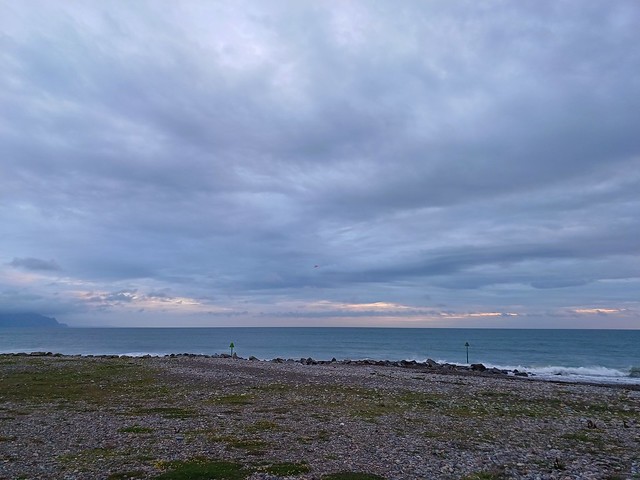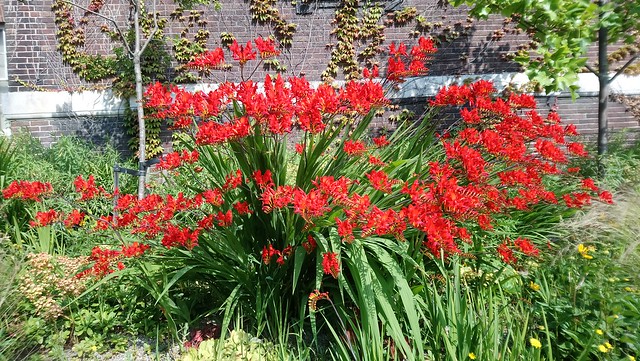Words for colour, hue, pigment and related colours in Celtic languages.
Words marked with a * are reconstructions.
| Proto-Celtic | *līwos = colour |
|---|---|
| Gaulish | *lios = colour |
| Old Irish (Goídelc) | lí [ˈtane] = lustre, beauty |
| Middle Irish (Gaoidhealg) | lí, li = beauty, lustre, glory, complexion, slendour, appearance, pallor |
| Irish (Gaeilge) | lí [l̠ʲiː] = colour, complexion, lustre, sheen, pigment(ation) líú = (act of) colouring, painting |
| Scottish Gaelic (Gàidhlig) | lì [l̪ʲiː] = paint, colour, tinge, hue, complexion, properity, happiness lìth [l̪ʲiː] = lustre, gloss, splendour, complexion, hue lìtheach [l̪ʲiː] = greasy, slimy,slippery |
| Manx (Gaelg) | lhee = pigment, pigmentation |
| Proto-Brythonic | *lliw = colour |
| Old Welsh | liu = colour, hue |
| Middle Welsh (Kymraec) | llyu, lliw, lliỽ, llyw = colour,hue lliwyav, lliwaw = to colour, paint, dye lliỽyd, lliwyd = dyer, colourer, painter |
| Welsh (Cymraeg) | lliw [ɬɪu̯] = colour, hue, tint, complexion, countenance, colouring lliwddall = colourbind lliwgar = colourful, vivid, beautiful, handsome lliw(i)af, lliw(i)o = to colour, tinge, paint, dye lliw(i)og = coloured, tinted, dyed, painted lliwydd = dyer, colourer, painter |
| Old Cornish | liu = colour |
| Middle Cornish (Cernewec) | liu, lyw = colour, dye, hue liue = to colour, paint liuor = painter, dyer |
| Cornish (Kernewek) | liw = colour,dye, paint liwa = to colour, dye, paint liwans = painting liwus = colourful liwayans = painting, picture liways = coloured, dye |
| Old Breton (Brethonoc) | liu = colour, ink, dyed |
| Middle Breton (Brezonec) | liu, liou = colour, ink, dyed liuaff = to colour, dye, paint |
| Breton (Brezhoneg) | liv [liw] = colour, ink, paint, dyed livañ [ˈliː.vã] = to colour, dye, paint, depict livek [ˈliːvek] = coloured liver, livour [ˈliː.vɛr/ˈli.wːər] = painter, colourist livus [ˈliːvys] = dye, picturesque |
Etymology: from Proto-Indo-European *slih₂-wó-s from *(s)leh₃y- (blueish, plum-coloured) and *-wós (creates adjectives from verb stems) [source]. Words from the same PIE roots include livid, lurid and sloe in English, slíva (plum) in Czech, and possibly lloer (moon) in Welsh, loor (moon) in Cornish and loar (moon) in Breton [source].
| Old Irish (Goídelc) | dath [daθ] = colour, dye |
|---|---|
| Middle Irish (Gaoidhealg) | dath = colour, dye, hue, tint, complexion dathach = coloured dathaid, daithaigid = colours, dyes, stains dathamail = coloured, fine, handsome, beautiful, comely, graceful dathugud = colouring, dyeing, painting |
| Irish (Gaeilge) | dath [d̪ˠax/d̪ˠɑh/d̪ˠah] = colour, dye dathach = coloured dathadóir = colourist, dyer, painter, exaggerator, fictionist dathadóireacht = (act of) dyeing, painting dathaigh = to colour,dye, paint dathannach = multi-coloured, gaily-coloured, colourful, glowing dathdhall = colour-blind |
| Scottish Gaelic (Gàidhlig) | dath [dah] = colour, colouring, dye, pigment, dying, hue, tint, staining, suit (of cards) dathach [dahəx] = coloured, colourful dathachadh [dahəxəɣ] = colourising, dyeing, staining dathadair [dahədɪrʲ] = dyer, colourist dathail [dahal] = colourful dathte [dahdʲə] = coloured |
| Manx (Gaelg) | daah = colour, dye, hue, paint, pigment, singe, stain, tincture daahagh = coloured, stainable daahder = colourer, colourist, dyer, exaggerator, painter daahit = coloured, dyed, painted, pigmented, stained daahoil = colourful, picturesque, well-coloured |
Etymology: unknown [source].
| Old Irish (Goídelc) | gné = appearance, form, kind, sort, species |
|---|---|
| Middle Irish (Gaoidhealg) | gné = kind, species, appearance, form, way, manner |
| Irish (Gaeilge) | gné [ɟnʲeː/ɟɾʲeː] = species, kind, form, appearance gnéitheach = specific, of good appearance gnétheacht = specificity gnéthigh = to regain appearance, mend |
| Scottish Gaelic (Gàidhlig) | gnè [grʲɛ̃ː] = sex, gender, genre, kind, sort, temper, disposition, genus, species gnè-fhàs [grɛ͂ː aːs] = evolution gnè-eòlas = typology |
| Middle Welsh (Kymraec) | gne = colour, tint, hue, sight, aspect gorne = colour, hue, tint |
| Welsh (Cymraeg) | gne = colour, tint, hue, sight, aspect agne = colour, tincture gorne = colour, hue, tint, tincture, blush, brightness, appearance, aspect |
Etymology: from PIE *ǵenh₁- (to produce, beget, give birth) [source]. Words from the same roots include gender, general, generate, genius and germ in English [source].
Sources: Wiktionary, Am Faclair Beag, Online Manx Dictionary, Teanglann.ie, eDIL – Electronic Dictionary of the Irish Language, In Dúil Bélrai English – Old Irish glossary, Geiriadur Prifysgol Cymru, Gerlyver Kernewek, Dictionaire Favereau, TermOfis, English – ProtoCeltic WordList (PDF), Etymological Dictionary Of Proto Celtic











